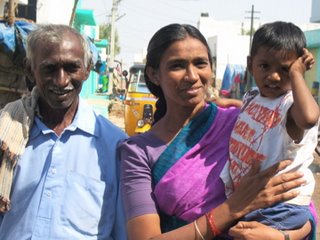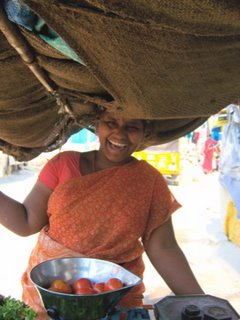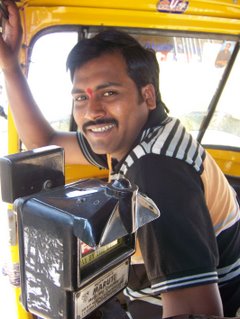 Even though we are still in the cow shed, we just received an award from the Center for Organizational Development for excellence in education. The Lions Club of Jubilee Hills put us on their “Permanent Projects” list! The SSA decided to “adopt” one of our special needs children, including paying the bills for their medical care. (See post, "Almost a Cinderella Story") A previous post (see post, "Happy New Year! A Big Donation from ISH") was on the unexpected joy of received a donation from the International School of Hyderabad for our new school building. Finally, the Chirec School, another private school nearby, is in the process of “adopting” us. Imagine what we can do in a real building!!
Even though we are still in the cow shed, we just received an award from the Center for Organizational Development for excellence in education. The Lions Club of Jubilee Hills put us on their “Permanent Projects” list! The SSA decided to “adopt” one of our special needs children, including paying the bills for their medical care. (See post, "Almost a Cinderella Story") A previous post (see post, "Happy New Year! A Big Donation from ISH") was on the unexpected joy of received a donation from the International School of Hyderabad for our new school building. Finally, the Chirec School, another private school nearby, is in the process of “adopting” us. Imagine what we can do in a real building!!This is what it is like to be a mature school, rather than a start up. We really are moving into the second phase. Construction is actually, really started. We have organization, management (working on that), and resources. It is a real school! Every morning, I would wake up and think ,“Lets run a school and see what happens.” It made my stomach drop like I was on a roller-coaster ride. Now I wake up and think, "What can we do to make the school stronger? Serve the students better? Make the teachers great?"
Our VIPs
The school is structured around two operating principles. First, the child is the center of the instruction. Second, we deliver the service of education and the parents are the customers. The law says school is compulsory, but this is not enforced (working on that, more next post). So the parents actually do have choices. We are asking them to choose our school, rather than send their children to work to develop skills of another sort.
 Our parents are construction workers, three-wheel autorickshaw (putt-putt) drivers, vegetable vendors, seasonal farmers, and small merchants or service providers like this father (see right) who is a knife sharpener. He uses his bicycle to turn the sharpening stone. He is helping another father (standing behind the bike) who runs the local tea stall.
Our parents are construction workers, three-wheel autorickshaw (putt-putt) drivers, vegetable vendors, seasonal farmers, and small merchants or service providers like this father (see right) who is a knife sharpener. He uses his bicycle to turn the sharpening stone. He is helping another father (standing behind the bike) who runs the local tea stall. This mother is a vegetable vendor. Most of these parents are illiterate and their families live on one meal a day. Convincing them to allow their children to go to school, not work, means convincing them to forgo an additional meal that the children could pay for if they had jobs.
This mother is a vegetable vendor. Most of these parents are illiterate and their families live on one meal a day. Convincing them to allow their children to go to school, not work, means convincing them to forgo an additional meal that the children could pay for if they had jobs.In our parents’ meetings and in our regular wandering around the neighborhood, Ismail and I ask the parents what they want their children to learn at our school. English is their first request. Computers are the second request. Both are considered marketable skills, something worth keeping their children out of the workplace.
This father (below) is a putt-putt driver. He and the other parents take for granted that Telugu literacy and the other usual subjects, like Maths, will be taught. Some of the parents have little tolerance for any perceived lack of progress by their children in these subjects. This varies with the level of literacy in the parents. Some have no idea and are afraid to speak up, others have definite ideas about what their children should be learning. Whatever the case, they are the VIPs and it is our duty to listen.

By far, the largest number of unbidden questions we get from the parents involve health. We are stopped and asked where are the good clinics and where to find good doctors (thanks again to Dr. Pat for all her help, www.irhs.org). Last week, one young woman approached me with her newborn (she a good momma, just had her little boy vaccinated) and her mother. Her mother spoke first, saying her daughter needed a family planning operation. She has two babies now and that was enough. A cluster grew around Ismail as he explained where the Government Maternity Hospital was located. Plus, the hospital pays 120 rupees to any woman who wants to get their tubes tied! Now the whole neighborhood is talking about it. Finally, again last week, another mother approached me with her little one. We suspect he is a cerebral palsy kid. He is just 5 months old, his mother is an excellent mother, and we quickly introduced her to Adi Laxmi (Eliya's mommy). All of us are so excited to show the little one to Dr. Swarthi at Nilofer Hospital. Early intervention is the best chance for a health special needs kid! We are so excited to have another VIP special needs mother in our group.
Comments
Post a Comment
Leave a Message